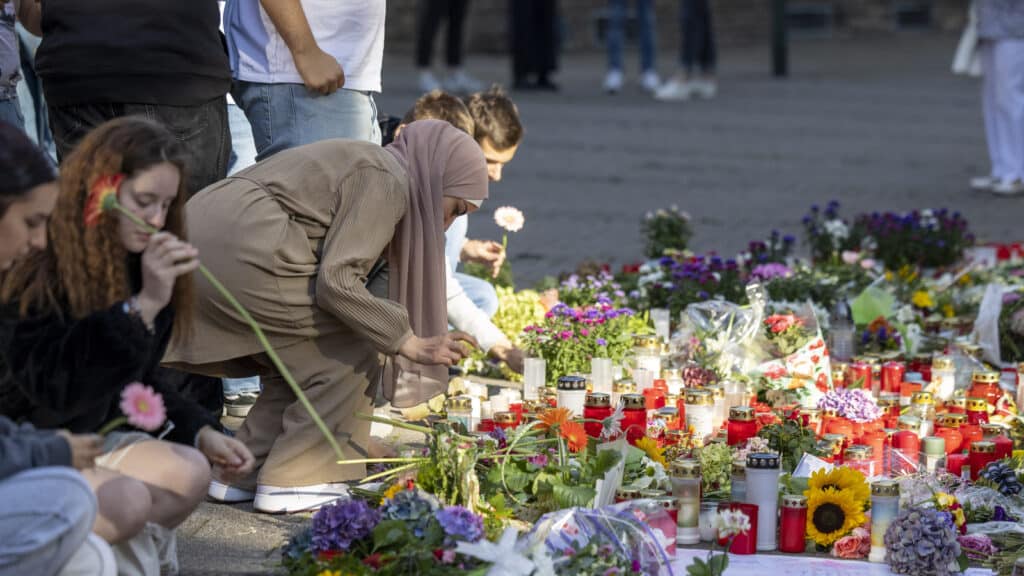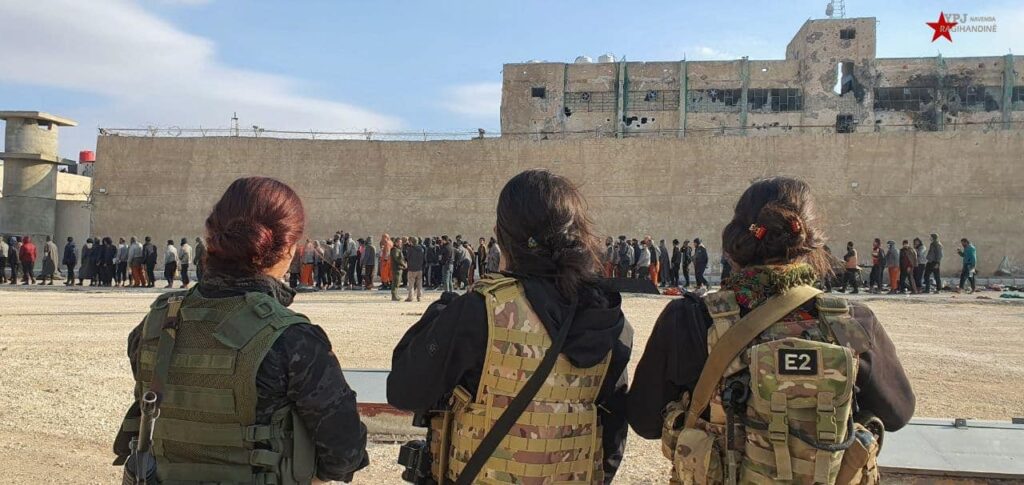The terror of Solingen: What we should be talking about
What we are witnessing right now in Germany is how the attack is used to legitimize right-wing demands for deportations. Everyone is talking about “terrorism”. A generalization that serves to conceal the background. Because the terror in Solingen has a name, a political, organizational and historical background: ISIS, the Islamic State in Iraq and Syria.
Riseup4Rojava
28.08.2024
GERMAN

On Friday, August 23, a man in Solingen, Germany killed 3 people with a knife at a city festival and injured 8 people, some of them seriously. The perpetrator handed himself in to the police a short time later. The 26-year-old Syrian from Deir Ez-Zor came to Germany in 2022. The public debate that was sparked after the attack in no way contributes to a realistic assessment of the underlying circumstances and prevents the search for solutions and precautions to prevent such attacks in the future. While the debate talks in general terms about ‘terrorism’, it is largely overlooked that the attack in Solingen was carried out by ISIS. Turkey’s support for ISIS is also a central but largely ignored aspect.
Terrorism, the Islamic State and support by the Turkish state
What is happening right now in Germany and other European countries is an ruthless instrumentalization of the crime to legitimize right-wing demands for forced deportations. Everyone is talking about “terrorism”. A generalization that serves to conceal the background. Because the terror in Solingen has a name, a political, organizational and historical background: ISIS, the Islamic State in Syria and Iraq.
In connection with attacks such as the one in Solingen, we would do well to draw attention to the role that the Turkish state, among others, has played and continues to play in the rise of the Islamic State. Turkey has supported IS in its fight against the Kurdish freedom movement for as long as it has served its interests:
– the Turkish-Syrian border was open to ISIS supporters from all over the world
– Oil from the areas occupied by ISIS was exported via Turkish territory
– the Turkish secret service MIT maintained close contact with the ISIS leadership
– ISIS members arrested in Turkey in a media-effective manner were released again after a short time
ISIS prisoners on the run
The perpetrator of the Solingen attack fled to Germany in 2022. In the same year, ISIS carried out a large-scale attack/breakout attempt in Sina prison in Hesekê (northern and eastern Syria). While the inmates revolted, ISIS units attacked the complex from the outside. Around 200 ISIS attackers infiltrated the region from areas occupied by the Turkish state in Serê Kaniyê and Girê Spî since 2019.
In the week-long fighting in the prison and the surrounding area, 40 SDF fighters, 77 prison personnel and 4 civilians were killed. Between 30 and 300 prisoners managed to escape and many of them are still at large. According to various sources, they were brought to the ISIS-controlled desert region on the Syrian-Iraqi border by ISIS smugglers. According to the Rojava Information Center, however, at least 4 high-ranking ISIS leaders reached Turkish-occupied territory. It is expected that mainly high-ranking escaped ISIS supporters have found refuge in the Turkish-occupied areas.

To this day, the SDF continues to conduct regular operations to uncover ISIS sleeper cells. According to the testimonies of captured ISIS members, they continue to receive instructions and support from the Turkish Intelligence Service (MIT).
The USA, which supports the SDF in the fight against ISIS (of course only to secure its own geopolitical interests), has eliminated numerous IS leaders by air strikes in recent years. Where were they staying until then? In the areas occupied by the Turkish state in Syria, in Idlib & Afrin.
Displacement and the “war against terror”
When we talk about the international threat posed by Isis, we cannot ignore the situation in North and East Syria: After the military victory of the SDF against the Islamic State, thousands of ISIS fighters are in prisons and their families in camps in the region, posing a constant security risk to the local population but also to the world. Among the prisoners are hundreds of citizens of numerous European countries, whose repatriation the Autonomous Administration has been unsuccessfully demanding from the responsible states for years.
Following the deadly IS attack, politicians and the media in Germany are outbidding each other with proposals and demands for deportations to war zones, which for many of the refugees concerned would mean that they would be handed over to the Taliban in Afghanistan or the Assad regime in Syria. They expect torture and social stigma there.
A few days before the attack in Solingen, Îlham Ehmed, the foreign affairs representative of the Democratic Autonomous Administration of North- and Eastern Syria, emphasized in an interview with a German newspaper that the Autonomous Administration is prepared to take in Syrians who are threatened with forced deportation:
“We are against forced deportations, but if the German government decides to do so, then we will gladly take in people in northern and eastern Syria instead of them being tortured elsewhere. But this would require international support and close cooperation with the Self-Adminstration”
She also emphasized that the threat posed by IS continues to exist and that the European states are not taking it seriously:
“Every country thinks about the safety of its own population first. The fact that IS fighters remain in our region is also a danger for the people here in Europe. But there is no serious response to this on the ground. Not enough is being done to combat the active IS cells. Now that Turkey has attacked the area and destroyed the infrastructure, the danger posed by IS on the ground has increased. ”
In the so-called “fight against the causes of migration” in Syria, the Democratic Autonomous Administration of North and East Syria, with its focus on grassroots democracy, women’s liberation and ecology, is a ray of hope in a region plagued by imperialist wars and destabilization.
The attacks by Turkey, which recently destroyed a large part of the critical infrastructure in winter, are causing migration on the one hand and strengthening ISIS on the other.
The force that was crucial in bringing about the fall of the Islamic State in Syria and Iraq was the Kurdish freedom movement, which paid an unimaginable price: 10,000 martyrs from all parts of Kurdistan not only liberated the region from the terror of the Islamic State, but also deprived it of its operational base and resources for terrorist attacks around the world. The PKK and the YPG/YPJ have played a decisive role in the fight against the terror of the Islamic State. The fact that the PKK is still considered a terrorist organization by many European countries and that even the display of YPG flags is a reason for legal proceedings speaks volumes. While Turkey is being courted by the so-called West as a reliable partner, Kurds in Europe and especially Germany and France are being subjected to massive repression.
We have no illusions that European states, above all Germany, Erdogan’s close partner in the fight against the Kurdish freedom movement, will take serious steps to solve the root of the problem. Nevertheless, we would do well to attack the narrative of a vague “terrorism” that only fuels hatred towards Muslims and refugees. Let’s call out those responsible by name. The terror of the Islamic State would not have been possible without the support of the AKP-MHP regime in Turkey, nor is it possible today. We must name those responsible and insist on a serious confrontation with the threat posed by ISIS and its supporters.
